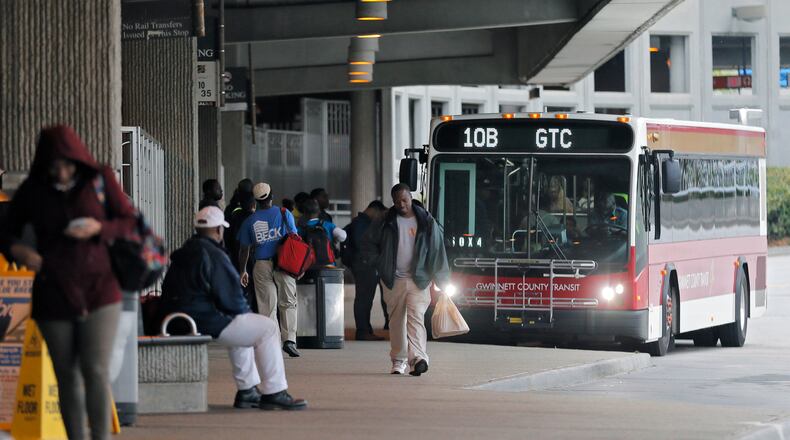A new poll focused on Gwinnett's appetite for MARTA serves as a not-so-subtle reminder that turnout — and the composition of that turnout — will likely decide the county's historic March referendum.
The poll that Rosetta Stone Communications completed for Channel 2 Action News was conducted Monday and released Wednesday. It surveyed a total of 960 landline and cellphone users from a pool of people who "routinely voted in general elections," Rosetta Stone president John Garst said.
About 48 percent of those surveyed said they opposed Gwinnett’s upcoming referendum, the passage of which would ratify the county’s pending contract with MARTA and opt residents in to a new 1 percent sales tax to pay for transit improvements. About 41.5 percent of respondents said they were in favor of the referendum. To pass, the referendum must get 50 percent plus one vote.
Another 10.5 percent of poll respondents said they were undecided. The margin of error was 3.1 percent. (Read the full results at the bottom of this article)
With other surveys and polls conducted in recent years suggesting that a majority of Gwinnett residents have an appetite for transit and a willingness to pay for it, the overall numbers from Rosetta Stone's report are worth noting.
But the most telling information may lie in the deeper details of who shows up at the polls.
“It’s about as cut and dry as I’ve ever seen a poll,” Garst said. “Voters under 40 and African-American voters are going to vote for this. Voters over 40 who are white … don’t appear to be.”
That’s not especially surprising. But Garst said the starkness of the divide surprised him — and makes it very clear that, if the referendum is to succeed, advocates will have to turn out young and diverse voters.
About 90 percent of the voters that Rosetta Stone surveyed were over 40. About 62 percent were white. Garst said the polling demographics were meant to reflect the turnout during December’s runoff election, which included statewide races for Secretary of State and the Public Service Commission. But he admitted that it’s hard to predict what turnout will actually be for an election that’s both a stand-alone affair, which generally means low turnout, and one involving such a divisive issue.
Gwinnett’s potential voting pool is far more diverse than those included in the poll, too.
A recent analysis of the approximately 530,000 registered voters in Gwinnett County suggested that less than 43 percent were white. The county voted overwhelmingly for Democrat Stacey Abrams in November's gubernatorial election, and for Hillary Clinton in 2016.
The trick for advocates will be to get such voters to the polls.
Brian Robinson is the spokesman for Go Gwinnett, a pro-transit committee pushing for the referendum’s passage. In a statement sent to the Atlanta Journal-Constitution in response to Rosetta Stone’s poll, he said the vote gives Gwinnett “a tremendous opportunity” to improve commutes and attract high-paying jobs.
“The more facts that Gwinnett voters know, the more likely they are to vote yes,” Robinson said. “Our goal is to make sure voters have the resources to make an informed decision.”
No formal committee has formed to oppose the referendum.
About the Author
The Latest
Featured


